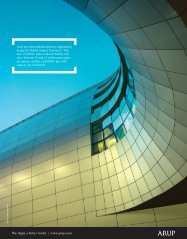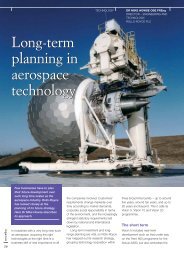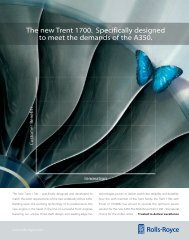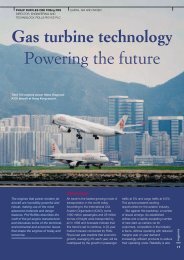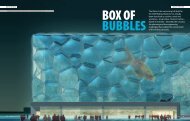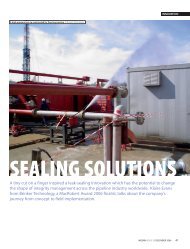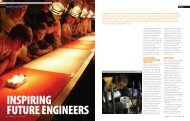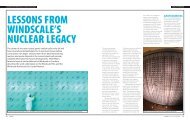Download article (252KB) - Ingenia
Download article (252KB) - Ingenia
Download article (252KB) - Ingenia
You also want an ePaper? Increase the reach of your titles
YUMPU automatically turns print PDFs into web optimized ePapers that Google loves.
NEWS AND DEBATE<br />
JOHN TURNBULL FREng<br />
Trust me,<br />
I’m an engineer!<br />
Should the public trust<br />
advocates of new technologies?<br />
ingenia<br />
10<br />
Engineers have always faced<br />
uncertainties in the design,<br />
construction, operation and<br />
maintenance of products and<br />
processes. Choices have to be made<br />
at all stages, and optimising them<br />
requires considerable skill and<br />
judgement.<br />
Historically each engineering<br />
discipline has developed its own<br />
approach to handling these<br />
uncertainties but there are many<br />
common concepts and approaches.<br />
Modern risk assessment and<br />
management processes provide a<br />
framework that will potentially deliver a<br />
multi-disciplinary general methodology.<br />
The Academy’s Risk Management<br />
Project aims to discover just how much<br />
common ground there is across the<br />
various disciplines and then to establish<br />
the best practice available to deal with<br />
the relevant issues and challenges.<br />
The project began with three<br />
seminars. These dealt with:<br />
i) the generic methodologies used to<br />
optimise performance and reliability<br />
ii) commercial and financial risks<br />
iii) the acceptability of technology and<br />
engineering projects in the wider<br />
community.<br />
Three working groups were convened to<br />
follow up on some of the priority issues<br />
arising from the seminars. The<br />
conclusions of the working group on the<br />
‘Societal Aspects of Risk’ provided. the<br />
most interest and feedback to the<br />
Academy. The approach adopted was a<br />
generic one applicable to all engineering<br />
disciplines and the conclusions are<br />
relevant across the board. The report of<br />
the working group has been much in<br />
demand. This high level of interest is<br />
very much in keeping with a trend seen<br />
in the Academy of increasing interest by<br />
Fellows in ‘soft topics’ such as ethics<br />
and social responsibility.<br />
It was decided to follow up on the<br />
Societal Aspects Report using a format<br />
more normally associated with non
NEWS AND DEBATE<br />
Speakers from left to right<br />
Tony Gilland, Sir Peter Williams,<br />
Ian Taylor (Chair),<br />
Professor Kathy Sykes,<br />
Dr Douglas Parr<br />
technical issues and one not used by<br />
the Academy before – namely a debate.<br />
The debate was held on 16 June and<br />
the motion was ‘This House believes<br />
that the public is justified in its mistrust<br />
of the advocates of new technologies.’<br />
The Chairman was Ian Taylor MBE MP,<br />
Minister for Science & Technology,<br />
1994–1997. The speakers for the<br />
motion were Professor Kathy Sykes,<br />
Collier Chair in Public Engagement in<br />
Science & Engineering, Bristol<br />
University and a member of the<br />
Council for Science & Technology; and<br />
Dr Douglas Parr, Chief Scientist of<br />
Greenpeace UK. Speaking against the<br />
motion were Sir Peter Williams CBE<br />
FREng FRS, a Vice President of The<br />
Academy, and Chairman of the<br />
Engineering Technology Board; and Mr<br />
Tony Gilland, Science and Society<br />
Director, the Institute of Ideas. The<br />
diverse audience numbered 150 and<br />
included one government minister, Dr<br />
Kim Howells MP, Minister for<br />
Transport.<br />
The debate was recorded and a<br />
more complete report will be prepared<br />
and published on the Academy’s<br />
website (www.raeng.org.uk). In<br />
summary, the dominant themes that<br />
arose were those surrounding the<br />
manner in which technology is<br />
developed and then presented to<br />
society. There were of course<br />
concerns expressed about specific<br />
technologies such as GM crops, and<br />
also the neglect of sustainability in<br />
many developments. But these<br />
concerns were much less than one<br />
might have expected. The dominant<br />
issue built on one of the key messages<br />
in the Academy report. It is much<br />
easier to gain acceptability for change<br />
if those who will be affected are<br />
involved in an open and serious way in<br />
the early stages of development, and<br />
are allowed to provide input in the way<br />
in which the development proceeds<br />
and is presented.<br />
This of course is not easy.<br />
Commercial considerations are involved<br />
and it takes a trained and<br />
knowledgeable person to appreciate<br />
the potential implications and risks<br />
involved in a technology at the early<br />
stages. There is more work for the<br />
Academy to do in this field by searching<br />
out and building on existing best<br />
practice. Another key message that<br />
came through was that there is a<br />
likelihood of mistrust if ‘advocates’ are<br />
seen to be either persons with a<br />
personal agenda or professional<br />
marketers willing to promote any<br />
technology that will benefit their<br />
commercial interests. Engineers and<br />
technologists themselves should be the<br />
‘advocates’ and be willing to be more<br />
open about the status of the<br />
technology, what it is hoped to achieve,<br />
and the potential risks involved.<br />
This raises the whole question of<br />
whether engineers are equipped to<br />
communicate with a wider general<br />
audience. On the face of it, it seems<br />
that the record is not good. A telling<br />
statistic is the paucity of engineers<br />
elected to Parliament compared with<br />
other professions such as law,<br />
teaching, medicine or the military. This<br />
could be an area for more active<br />
research by the Academy.<br />
The debate format served the<br />
Academy’s purpose very well. It was<br />
very gratifying to see so many present<br />
from outside the Academy’s Fellowship.<br />
Enormous benefit was gained from the<br />
observations and ideas of others,<br />
especially when they are of the calibre<br />
that was seen in Church House. It has<br />
provided a lot of food for thought and it<br />
will help us greatly in designing our<br />
future programme dealing with the<br />
Societal Aspects of Technology Risk. ■<br />
ingenia<br />
11



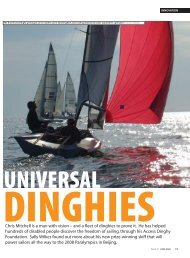
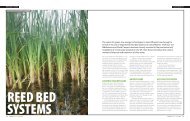
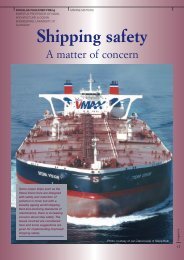
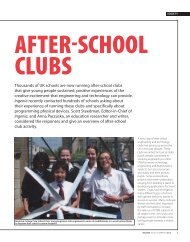
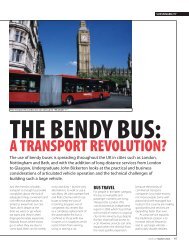
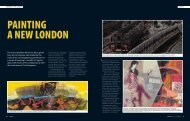
![[322/03] Francke - Ingenia](https://img.yumpu.com/23411337/1/184x260/322-03-francke-ingenia.jpg?quality=85)
